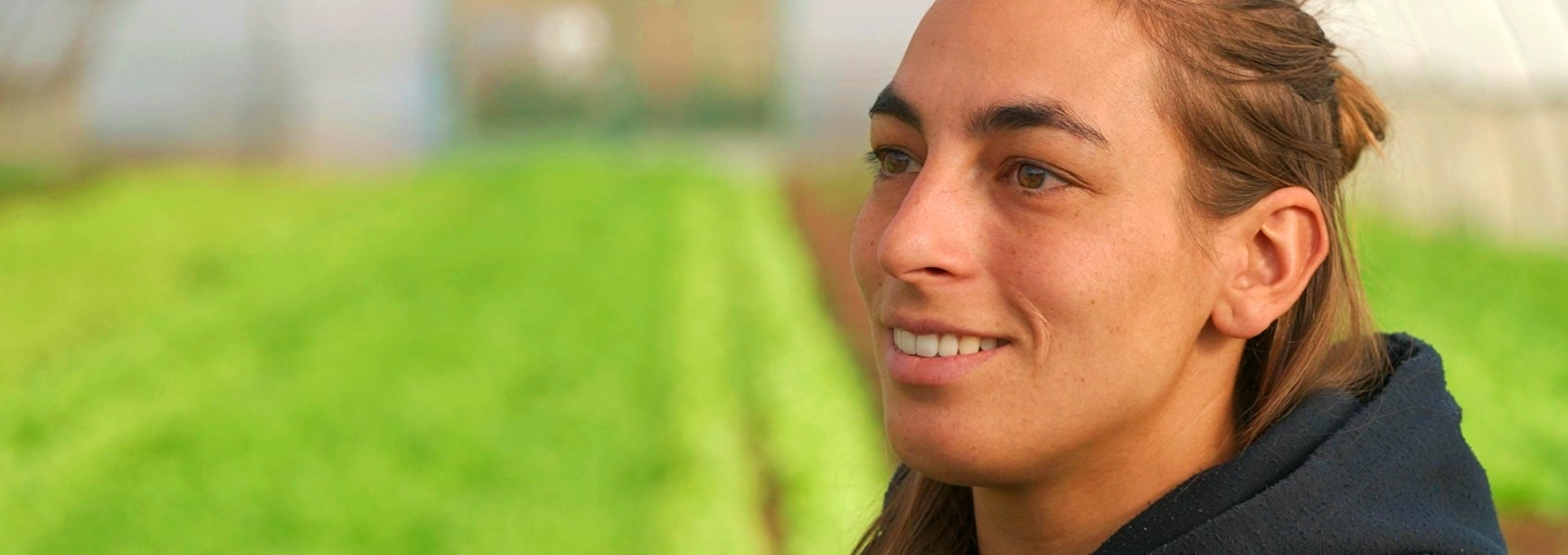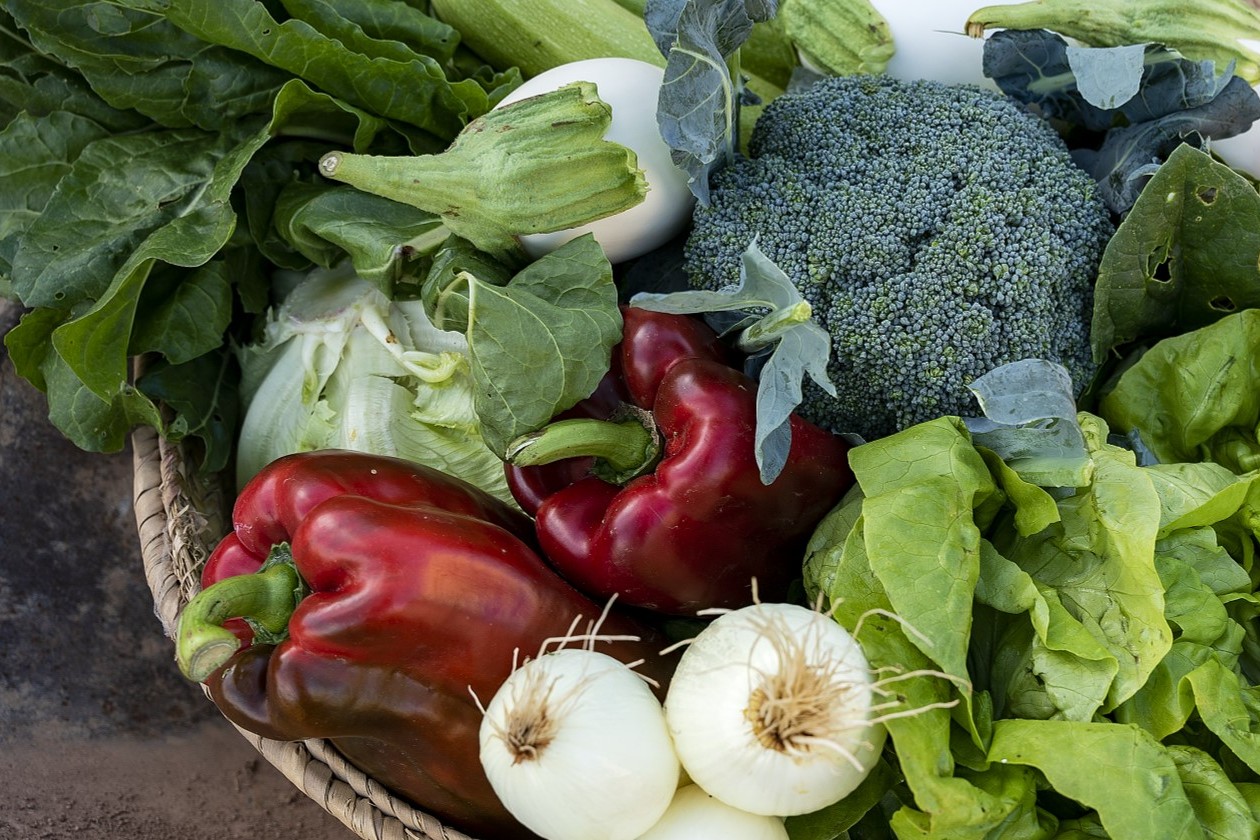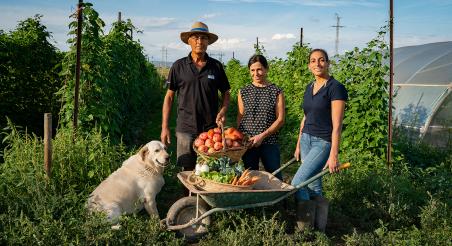Alba Casasayas is a young farmer and athlete who’s determined to continue her family’s legacy. Although she often heads to the water to indulge her passion for sport, the land has always been close to her heart and for the last four years she’s been working full-time in the family’s fields and greenhouses. The Les Arnaules estate, estate, named after a nearby natural calcareous rock bridge, is located in Manresa’s Viladordis district and comprises 110 hectares distributed as follows: the market garden occupies around 10 hectares, between 15 and 20 hectares are devoted to cereal crops and the rest is forest. The estate is also home to a small fattening pig farm and a flock of sheep, along with a few chickens for the family’s own consumption. This hard-working clan has had to become resilient in the face of adversity: several plots of land were expropriated from Alba’s grandparents, while last summer the estate was hit by the raging Pont de Vilomara forest fire. Alba’s father, Enric, braved the danger to save what he could, but was unable to prevent valuable olive and fruit trees from being lost to the flames.
It’s no secret that family support is one of the pillars of success of Les Arnaules. The business is run by Alba, her parents and an uncle, assisted by three workers who play a key role in the farm’s agricultural production. The company has been selling its fruit and vegetables at Manresa’s weekly markets for 14 years and has become well known for its revival of native varieties of the Bages area. More recently, it opened a farm shop on the estate itself.
Sport is also an essential ingredient in this family’s life. Alba’s siblings were water polo players and she also played the sport for 11 years. Nowadays, however, she’s a keen triathlete. This 27-year-old native of Manresa is certainly not short of energy.
What’s the farming history of your family? Can you tell us about the origins of Les Arnaules?
My grandad bought the estate when my dad was around 16 years old. Years earlier, it had been home to vineyards. Several plots of land had been expropriated from my family, which is how they ended up here. Les Arnaules was the last estate belonging to the family of the La Culla farmhouse, who were originally from Barcelona. That farmhouse is now the headquarters of the Regulatory Council of the Pla de Bages Protected Designation of Origin seal. My grandad was a friend of the family, which is how he came to purchase the estate, fifty years ago. Back then, there was no water supply, no electricity, no shed, not a single flat patch, not a single crop terrace. There was nothing. Nowadays, we get our water from the irrigation channel. So my grandad started from scratch: one year he flattened the fields, another year he built the pig sheds, and so on. I and my siblings were born in a different house, on Carrer Nou de Santa Clara, right opposite the Sant Joan de Déu Hospital in Manresa. But now we live here.
The estate started with nothing but now it’s got the lot: greenhouses, buildings, pens, the shop…
That’s right, my family has built everything bit by bit over the last fifty years.
Tell us about the work your grandad did.
My grandad started out delivering eggs, veal, chicken, vegetables, etc. to hospitals and clinics in Manresa. Over time we added supermarket chains such as Carrefour to our roster of customers and expanded our sales network to outlets in Barcelona, Terrassa, Manresa… When my dad was 18 years old, he and his brother started delivering vegetables in Barcelona, and they did that for 25 years. My dad always remembers that you were looked down upon at that time if you said you were a farmer, but delivering produce in Barcelona was a different story.
Perceptions regarding the farming profession have started to shift and are much more positive nowadays. Do you share this vision?
Yes, it’s true. To be honest, when I was 15 years old, I used to feel self-conscious about saying I was from farming stock, but that’s changed and now it’s something I feel positive about saying. As you grow up, you gradually become aware of everything the job entails.
After the Covid-19 pandemic, do you think this recognition has grown?
Oh yes, for sure. And nowadays you come across many more young farmers. In my case, for example, I’ve only been in the sector for a few years. I’ve always been involved one way or another but I wasn’t devoted to it full-time. When you find more people of your own generation and you offer each other support, everything gets easier.
«When you find more people of your own generation and you offer each other support, everything gets easier» Alba Casasayas
Do your friends and acquaintances understand your work?
Well, here’s an example: the other day we organised a dinner and there were some cow farmers there. I was chatting to a 24-year-old woman who told me it was really difficult to find someone capable of grasping what her work entailed, someone who understood her. She’s a farmer and hunter. «They think I’m crazy,» she said. «Well, I’m a farmer and an athlete,» I replied. We had a good laugh about it.
What was it like when you joined the family farm as a worker?
I joined four years ago. Before that, I worked for another company, doing administrative work. At that time my brother was here, having joined the business. Then, when he decided to call it a day, that’s when I joined. For a few months I tried to keep both jobs going, but my body was telling me otherwise. I was keeping up my sport as well, so you can imagine! I was juggling three occupations (the farming, the company and sport), but the fact is I wasn’t doing any of them properly. My body said enough was enough just when my dad had an operation, and I decided to commit to the estate. Now I do a bit of everything here. At that time, at 23 years old, I just had to act; I couldn’t think about what I wanted (or didn’t want) to do. At that age I found it really hard to decide about my future. My dad was getting on a bit, there was no one to take over at the estate, and it was decision time.
Now that a few years have gone by, what do you think about that decision?
It was the right one. My family kept going despite being expropriated and really grafted! Now it’s time for me to take up the baton and see where I can innovate, where I might need to tweak the project, etc. For example, when I joined the business, we set up the farm shop on the estate. It’s open for two hours in the afternoon from Monday to Friday and we’re really happy, it’s going well for us!
Has the philosophy changed at Les Arnaules over the years?
Generally speaking, it hasn’t, but we have overhauled our sales operation. Nowadays we only sell our produce in our own shop and at three weekly markets in Manresa: on Wednesdays in Plaça de les Oques, on Fridays in the Mion neighbourhood, and on Saturdays in Plaça Major. We are lucky to be able to sell our produce 10 minutes from our doorstep, with no intermediaries. We don’t do wholesale deliveries anymore; it’s all direct sales. The further you can get away from intermediaries, the better.
«We are lucky to be able to sell our produce 10 minutes from our doorstep, with no intermediaries» Alba Casasayas
Turning to your vegetable growing, you’ve revived some local varieties. Which ones have proved most popular?
Well, we grow green-shouldered tomatoes, which is a seed my grandad used! We’ve been growing them for years. Manresa green cabbage is another one we’ve always grown here. We revived the white aubergine a few years ago in partnership with Món Sant Benet of the Alícia Foundation. It was just when we’d started selling our produce at markets, so having new varieties was a great way to make ourselves known.
Looking back with a bit more perspective, what have you learned on the estate?
When you work the land, you realise that if you look after it properly, it gives you everything. That’s all there is to it, you just have to look after it. And you have to be constant, of course, you can’t let up. Ha ha ha!
What are your plans for the project?
To carry on what we’re doing on the estate and fix all the damage from the fire. It’ll be a slow process but we have to get things back to how they were. Before the fire we had fruit. It’s really hard to find recently picked, ripe fruit that’s ready to eat! Fruit arrives in box pallets from abroad these days; we were bucking the trend with local fruit. Our fruit is more organic than the organic fruit that comes from the other side of the world.
Generally speaking, what do you think the main obstacles are for young people who want to get into farming but don’t come from farming stock?
Without land, you can’t do anything. It’s hard to find somewhere and get started. If you haven’t got a large area to work with, you won’t be able to make a go of it. You can’t make a living from a little market garden; you need a sizeable piece of land and you have to work hard. If there’s a land bank, that’s different, because at least then you’ve got a resource…
«It’s not easy to find someone who wants to hand over their property to a stranger. But of course, you have to show some trust if you don’t want to lose everything» Alba Casasayas
You come from farming stock and you have a fairly large-scale project. How do you distribute the work?
My uncle looks after the paperwork, the fattening pigs and the deliveries, while we take care of the cultivation side of things: my dad does the planting and tractor work, while I and my mum take care of the picking and selling. We work together as a team. Until two years ago we kept cows for grazing and fodder, but these days someone else looks after the cereal for us.
In your case, despite the day-to-day challenges, the generational change is assured. What do you think is needed to foster the continuity of other estates that have no one to take up the baton?
Helping people who are getting started is crucial. There are lots of farms that have no one to take over, but I should also point out that there are elderly people who don’t want to hand over the reins to just anyone. It’s not easy to find someone who wants to hand over their property to a stranger. But of course, you have to show some trust if you don’t want to lose everything. These days you see more abandoned farmhouses than well-looked-after ones. There are also people who buy them up to use as rural tourism properties.
What’s a typical day like at a weekly market?
You get up early and set up your stall. You attend to your customers all morning. We’ve been selling at markets for 15 years and we’ve got customers who’ve been there since day one and never fail to turn up. If for some reason they can’t come, they’re almost apologetic about it. We’re lucky to have extremely loyal customers.
Looking at the project as a whole, what challenges are you facing?
We’d like to keep cows again, but apart from the fact that it entails a lot of work, this period of drought we’re going through doesn’t help, because there’s no water or food. My goal is to keep cows again because we’ve always reared them here and I miss them.
You’re a triathlete and you played water polo for several years. Where does this passion for sport come from?
Growing up, my siblings already played water polo: first my big brother and later my sister. From a very young age we were often at the swimming pool, doing classes. I did swimming for a few years and then, not long after I turned 10, I switched to water polo. I played for 11 years in the Manresa team. Sport has always been a fixture in my life! In fact, in my house we’ve always been into sport. I’ve always fitted sport in with my studies or jobs. Because we’ve grown up with sport, I find it odd that some people don’t do any. I need it. Sport is motivational, it brings out your competitiveness… You should know that I’m extremely competitive. Ha ha ha! Sport teaches you all sorts of values, such as being part of a team and overcoming obstacles.
How do you combine sports and agriculture?
I train as a triathlete, but it requires lots of hours… I go swimming twice a week at six in the morning and people think I’m crazy. But I’ve just got to do it; life is about more than work! The fact is I’d like to be able to train every day, but I can’t; my body says “enough” with all the farming work I’ve been doing. My body says “stop”, so I do.
Does sport help you when it comes to working the land?
Definitely! It’s good for my mental health and helps me to know when to take a break, because otherwise I’d never finish the work. It helps me to compartmentalise things and enjoy my moments. My family know that Sundays are sacred to me, that I’ll be out on my bike, for example. My training sessions are important to me. There are times of year when I have to make an exception, of course, such as in the summer when we harvest the vegetables. I know that’s how it is and I certainly don’t have a problem with it.
Do you think you have a nice life?
Yes, I wouldn’t change it for anything. I think live is good.
Family bonds play an important role in your day-to-day work, don’t they?
I remember how incredibly dedicated my grandad was to this land, and my dad after him. It would be emotionally tough to let it go. After all that dedication, why let it go if we can carry on?
Let’s end with a culinary question. Do you have a special memory of good food that you can share with us?
We’ve always eaten our own produce, both meat and vegetables. We’ve always slaughtered our own pigs. My grandad had calves, chickens, vegetables, eggs, pigs… It was all home produce.
— BCN Smart Rural Editorial —




